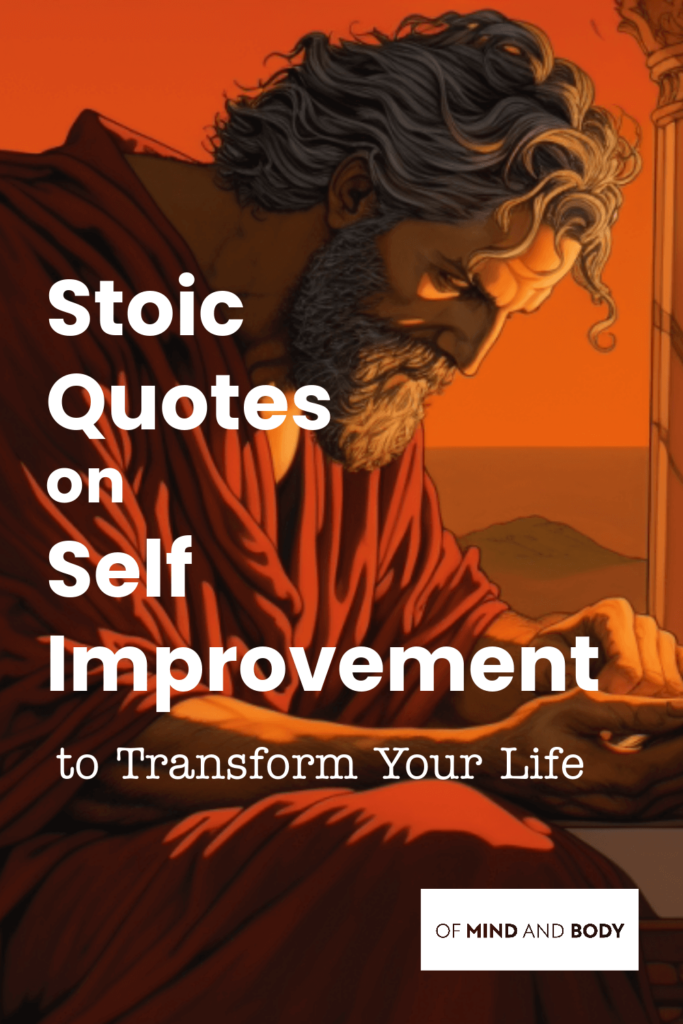
In this article, “Stoic Quotes on Self-Improvement,” we delve into a curated collection of 16 Stoic quotes that offer a unique perspective on personal–growth.
Stoicism is a way of life, it’s an ancient philosophy that has stood the test of time and is deeply intertwined with the essence of self–improvement. The practice of Stoicism is, at its core, a commitment to continual personal development, a steady path of becoming the best version of oneself.

These quotes are powerful stoic life lessons, a wisdom-laden road-map guiding us through the complexities and challenges of self–improvement. Each quote is a drop of knowledge from the ocean of Stoic thought, illuminating the path to self-awareness, resilience, and virtue.
As we explore these timeless insights, we invite you to reflect on their profound meanings and how they can be applied in the modern context of our lives. Join us on this enlightening journey of stoic quotes, where ancient wisdom meets contemporary self–improvement, guiding us towards a life of purpose, balance, and fulfilment.
16 Stoic Quotes on Self Improvement
- “We cannot choose our external circumstances, but we can always choose how we respond to them.”
- “Don’t explain your philosophy. Embody it.”
- “Only the educated are free.”
- “If you want to improve, be content to be thought foolish and stupid.”
- “Progress is not achieved by luck or accident, but by working on yourself daily.”
- “First say to yourself what you would be; and then do what you have to do.”
- “The key is to keep company only with people who uplift you, whose presence calls forth your best.”
- “No man is free who is not master of himself.”
- “Waste no more time arguing about what a good man should be. Be one.”
- “Look well into thyself; there is a source of strength which will always spring up if thou wilt always look.”
- “If you really want to escape the things that harass you, what you’re needing is not to be in a different place but to be a different person.”
- “Difficulties strengthen the mind, as labour does the body.”
- “Life is like a play: it’s not the length, but the excellence of the acting that matters.”
- “Luck is what happens when preparation meets opportunity.”
- “No man was ever wise by chance.”
- “Associate with people who are likely to improve you.”
Self Improvement Insights from Epictetus
“We cannot choose our external circumstances, but we can always choose how we respond to them.”
Epictetus
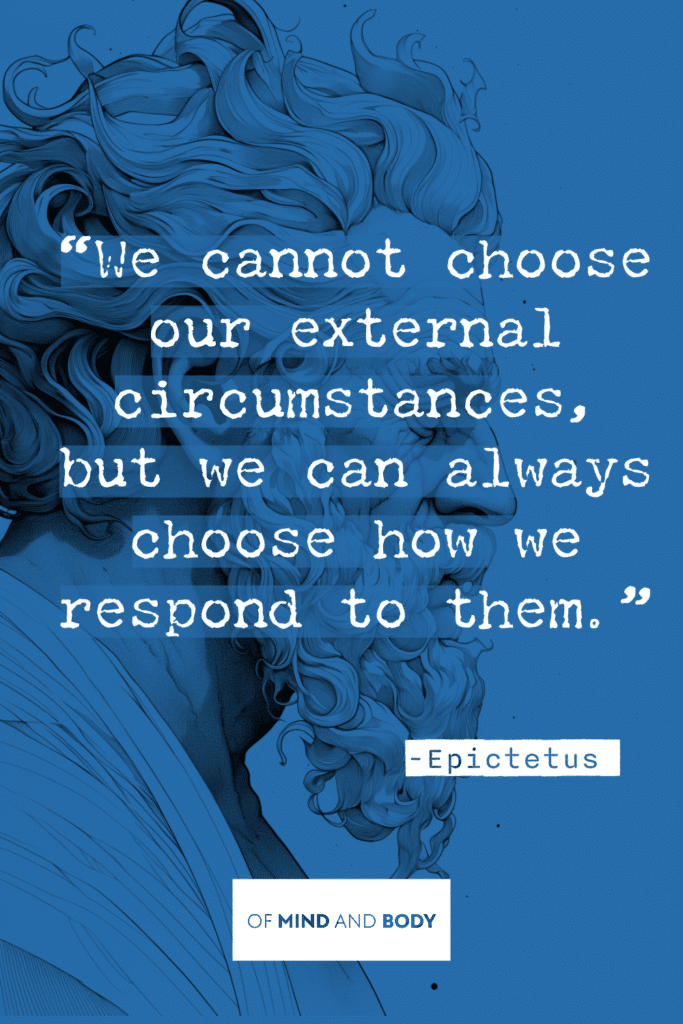
The Wisdom Behind the Words
The quote from Epictetus is a powerful cornerstone of Stoic philosophy, especially relevant to the journey of self–improvement. It encapsulates the Stoic belief in the supremacy of personal agency and mental fortitude over the unpredictability of life. This perspective is profoundly liberating and empowering, as it suggests that true control and freedom lie not in altering the world around us, but in changing our internal responses and attitudes.
In the context of self–improvement, this quote is a clarion call for self–empowerment and resilience. It reminds us that while we cannot control every aspect of our lives – be it the actions of others, societal pressures, or unforeseen events – we hold absolute power over our reactions and interpretations. This realisation can be transformative.
When we shift our focus inward, concentrating on cultivating patience, understanding, and emotional intelligence, we embark on a journey of profound personal growth. We learn to meet challenges with equanimity, to find lessons in adversity, and to maintain our inner peace and integrity in the face of external chaos.
Furthermore, this Stoic wisdom encourages a form of radical accountability that is deeply encouraging. It proposes that every moment of adversity is an opportunity for growth, every difficult interaction a chance to practise virtues like kindness and patience, and every setback a test of our resilience. This approach to life turns the very act of living into a continuous journey of self–improvement.
By choosing how we respond to our circumstances, we are constantly refining our character, sharpening our wisdom, and strengthening our mental fortitude. In this way, Epictetus’s words serve not just as a philosophical statement, but as a personal road-map for anyone seeking to live a more thoughtful, impactful, and fulfilling life.
“Don’t explain your philosophy. Embody it.”
Epictetus
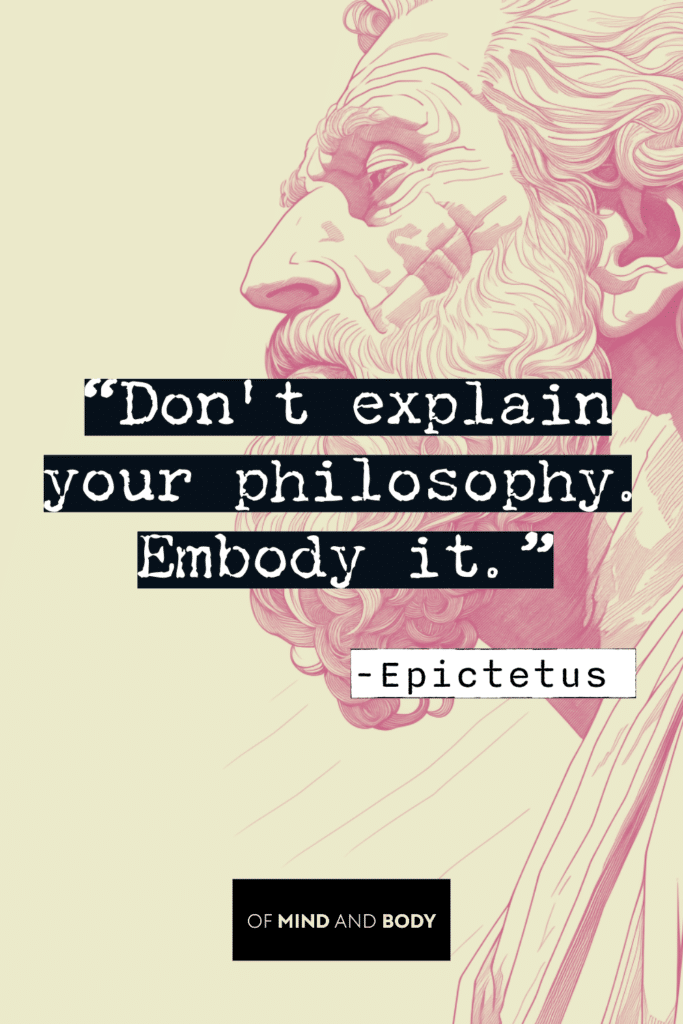
The Wisdom Behind the Words
This profound statement by Epictetus, a Greek Stoic philosopher, is a powerful call to action for anyone on a journey of self–improvement. It’s a reminder that true wisdom and personal growth are not merely about accumulating knowledge or espousing philosophical concepts, but about living out those principles in our daily lives. This quote challenges us to move beyond the theoretical and step into the practical application of our beliefs and values.
In the realm of self–improvement, this stoic quote emphasises the importance of authenticity and integrity. It encourages us to align our actions with our beliefs, ensuring that we are not just talking about ideals like discipline, resilience, and kindness, but actively practising them. This alignment is where true transformation occurs. For instance, if we value discipline, we embody this philosophy not by merely discussing its virtues, but by demonstrating it in our daily routines, whether in sticking to a fitness regime, maintaining a balanced diet, or managing our time efficiently. The emphasis is on ‘being’ rather than ‘seeming to be,’ fostering a life where our external actions reflect our internal ethos.
Moreover, Epictetus’ words inspire us to be role models. In embodying our philosophy, we inadvertently become beacons of inspiration for others. By living out the principles of Stoicism — such as managing emotions, focusing on what’s controllable, and facing challenges with equanimity — we not only improve ourselves but also influence those around us. Our actions, more than our words, can offer hope and guidance to others who are navigating their paths of personal growth. In essence, embodying our philosophy is a journey of continuous self–improvement that resonates and inspires, creating ripples of positive change in our community and beyond.
“Only the educated are free.”
Epictetus
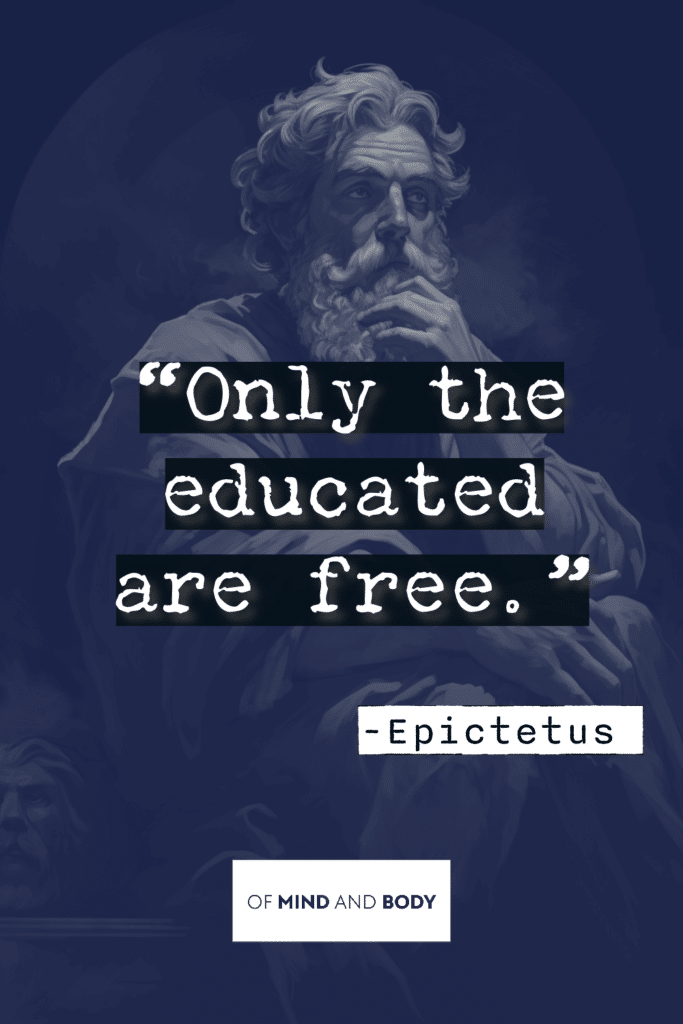
The Wisdom Behind the Words
The quote from Epictetus resonates profoundly with the journey of self–improvement. At its core, this statement is not merely about formal education or academic accomplishments; rather, it speaks to the essence of personal growth and enlightenment. In the Stoic view, ‘education’ is synonymous with the deep understanding of oneself and the world, a form of wisdom that liberates us from internal constraints like ignorance, irrational fears, and misguided desires.
To be ‘educated’ in the Stoic sense is to cultivate an awareness of what is within our control and what is not. It’s an invitation to focus on our own attitudes, choices, and responses to the external world. This perspective is empowering and liberating, as it shifts the locus of control inward. It’s about learning to navigate the complexities of life with a steady hand and a clear mind, constantly refining one’s character and understanding through introspection and mindful action.
Moreover, Epictetus’ notion of freedom is intrinsically linked to self–improvement. It suggests that true freedom comes from self–mastery, the ability to govern oneself with reason and virtue. This freedom is not an external circumstance but an internal state of being. It’s about breaking free from the shackles of unexamined habits, societal pressures, and reactive emotions. It encourages a life lived with intention, integrity, and a deep understanding of the human condition, aligning your personal and professional endeavours with the timeless pursuit of wisdom and virtue. This quote, thus, serves as a beacon, illuminating the path to a truly free and fulfilling life, underpinned by the continuous pursuit of self–improvement and enlightenment.
“If you want to improve, be content to be thought foolish and stupid.”
Epictetus
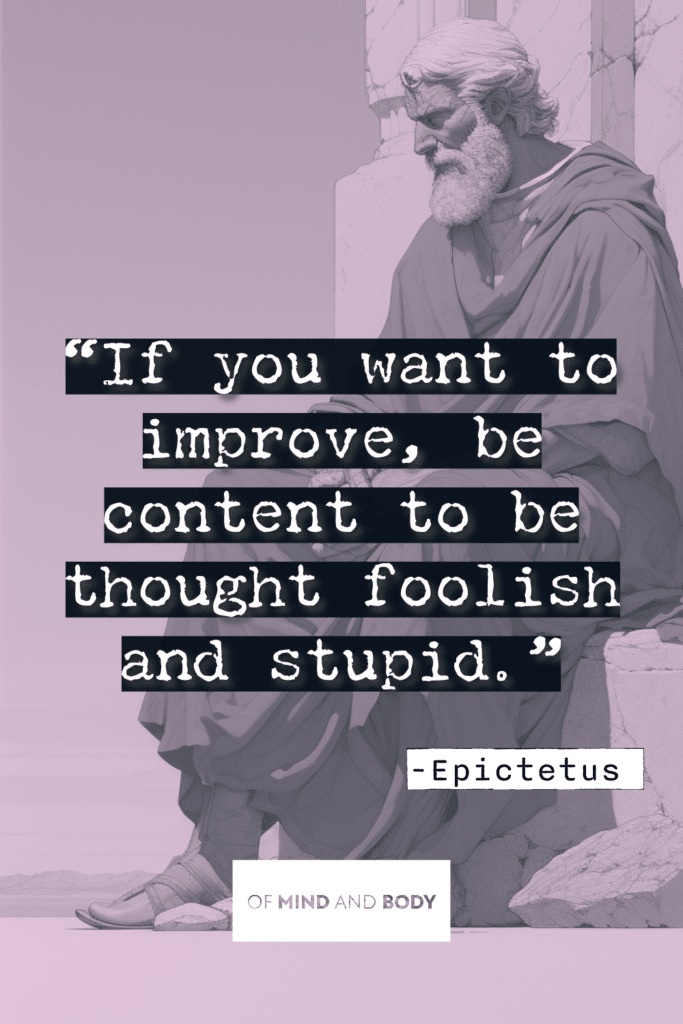
The Wisdom Behind the Words
This quote by Epictetus serves as a profound reminder of the courage required in the pursuit of self–improvement. At its core, the quote addresses a common barrier many face on their journey to personal growth: the fear of others’ opinions. Epictetus challenges us to embrace the possibility of being perceived as “foolish” or “stupid” in our efforts to improve ourselves. This is a powerful call to prioritise our own development over the perceptions and judgements of others. In the path to self–improvement, one must often step out of comfort zones, challenge prevailing norms, or admit to not knowing everything – actions that can indeed make one appear foolish in the eyes of some.
Delving deeper, Epictetus’ words echo the Stoic virtue of indifference to external opinions and focus on internal values. This philosophy encourages us to measure our worth and progress by our own standards rather than external validation. The pursuit of knowledge, wisdom, or new skills often involves moments of vulnerability and openness to learning, which might be misconstrued as ignorance or naivety. The quote suggests that true improvement lies in the willingness to endure these misjudgements. By doing so, we not only grow in our chosen endeavours but also cultivate inner strength and resilience, key components of the Stoic ideal of self-sufficiency.
Furthermore, this quote is a call to action for embracing authenticity and courage. The path to self–improvement is personal and unique, often requiring us to challenge conventional wisdom and explore uncharted territories. In such explorations, the fear of being judged can be a significant hindrance. Epictetus prompts us to rise above this fear, highlighting that the journey of self–improvement is, at its essence, a deeply personal and often solitary one. The freedom that comes from being indifferent to external judgement opens up a space for genuine growth and self-discovery. It’s a journey not just about acquiring new skills or knowledge, but fundamentally about transforming our character and perspective, aligning more closely with our true selves and our personal values.
“Progress is not achieved by luck or accident, but by working on yourself daily.”
Epictetus
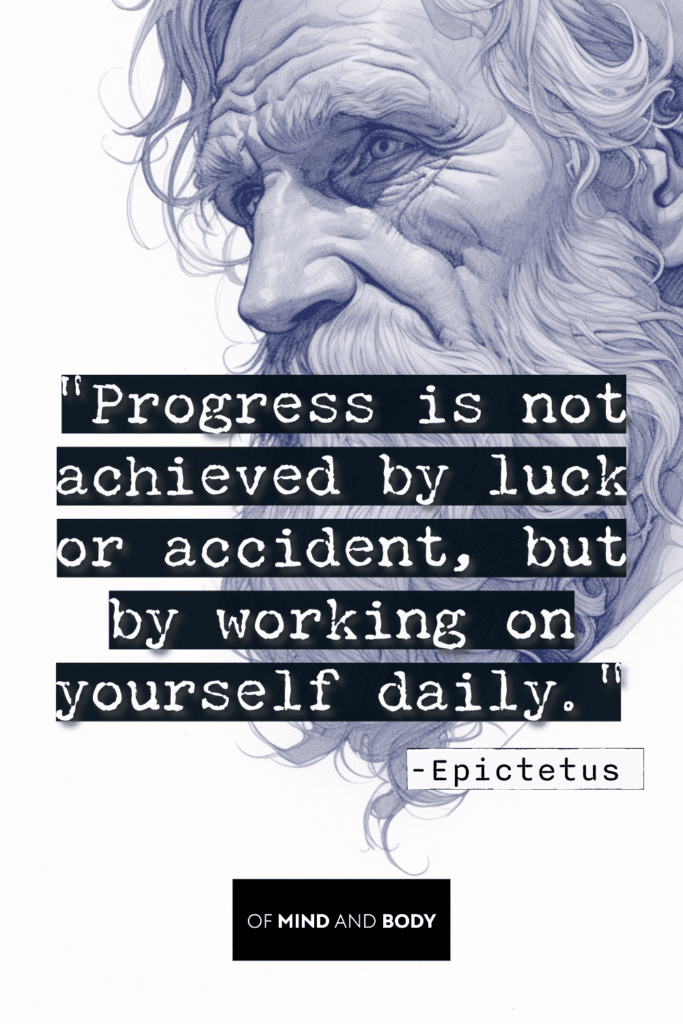
The Wisdom Behind the Words
This profound quote from Epictetus encapsulates a timeless truth about the nature of personal development and self–improvement. It dispels the common misconception that progress, whether in personal growth, career, or relationships, is often a matter of chance or external circumstances. Instead, Epictetus redirects our focus to the consistent, deliberate effort as the cornerstone of true progress. This perspective is a powerful reminder that the journey of self–improvement is a daily endeavour, shaped not by fleeting moments of inspiration or luck but by the steady, often unseen, efforts we make each day.
Epictetus’s words resonate deeply with anyone striving for self–improvement. They serve as an encouragement to embrace the slow, sometimes challenging process of personal growth. Each day is an opportunity to refine our character, learn new skills, or improve our responses to life’s myriad situations. This Stoic philosophy implies that the quality of our lives is largely dependent on our actions and attitudes, rather than external factors. It’s a call to be proactive, to engage actively with our own development. By doing so, we not only enhance our own lives but also become a beacon of inspiration and strength for those around us.
The essence of this quote lies in its call for mindfulness and persistence. Every small step, every conscious decision to be better than we were yesterday, accumulates into a journey of significant transformation. It reminds us that the path to self–improvement is continuous and often incremental. There are no shortcuts or quick fixes; instead, there is the empowering realisation that we hold the keys to our progress. Embracing this philosophy leads to a life lived with purpose and agency, where every day is a canvas for growth and every challenge an opportunity to practise and reinforce our commitment to self–improvement.
“First say to yourself what you would be; and then do what you have to do.”
Epictetus
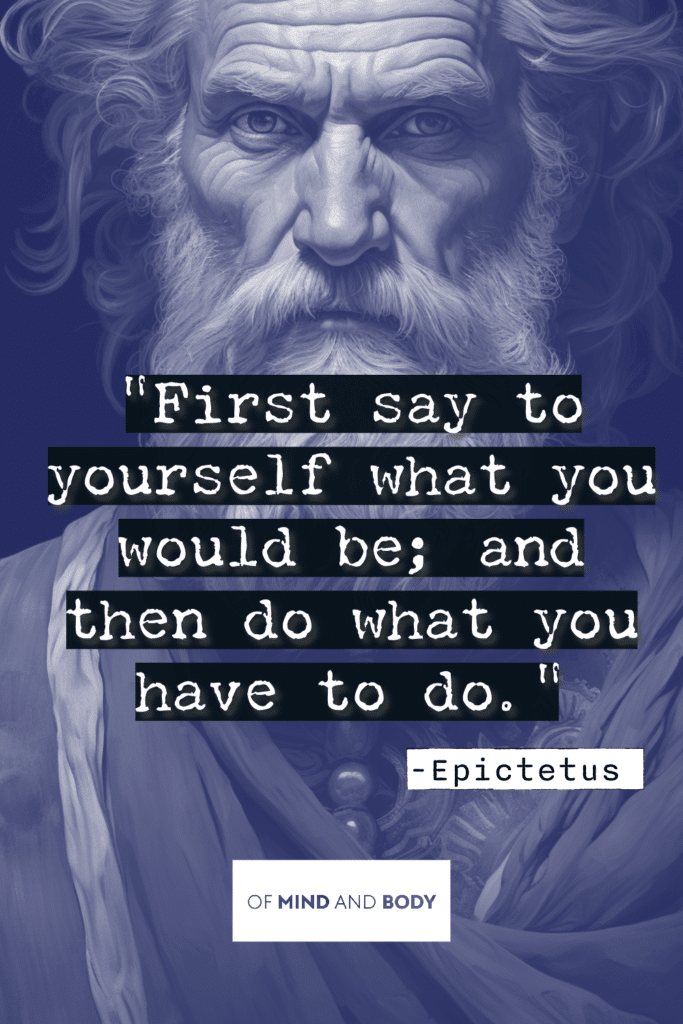
The Wisdom Behind the Words
This poignant quote, by the Stoic Philosopher, Epictetus encapsulates the essence of intentional living and the power of self-determination. At its core, it’s a call to clarity and purpose, urging one to first define their ideal self – the epitome of who they aspire to be in character, values, and actions. This introspective exercise is not merely about setting goals or ambitions; it’s a deeper, more profound journey into the heart of one’s true desires and virtues. In the realm of self–improvement, it speaks to the fundamental step of knowing oneself, acknowledging one’s strengths, weaknesses, and the values that are held dear. It’s about painting a vivid picture of the person you strive to become, setting a north star for your personal development journey.
The second part of the quote, “and then do what you have to do,” is a powerful testament to the Stoic belief in action and responsibility. Knowing is only half the battle; the true test lies in the doing. This is where the rubber meets the road in self–improvement. It’s about aligning one’s daily actions with the higher vision of oneself. This alignment demands discipline, courage, and resilience – qualities that are central to Stoic philosophy. It’s a reminder that aspirations and dreams don’t materialise through wishful thinking but through consistent, purposeful actions. Each day becomes an opportunity to embody the virtues and qualities of the ideal self, transforming lofty ideals into tangible reality. It’s a journey that involves not just the big leaps, but more importantly, the small, consistent steps taken every day.
The beauty of this quote lies in its simplicity and its profound implications. It’s a call to live deliberately and authentically, urging one to take the reins of their life firmly in their hands. In the pursuit of self–improvement, it serves as a guiding principle, a reminder that personal growth is a proactive and continuous process. It encourages embracing life’s journey with a clear vision and steadfast action, weaving the fabric of one’s character through daily choices and actions. This quote is a beacon for those seeking to forge their path, cultivate their virtues, and ultimately, become the best version of themselves. It’s a reminder that the power to change, grow, and improve rests within, waiting to be harnessed through clarity of purpose and the unwavering commitment to act upon it.
“The key is to keep company only with people who uplift you, whose presence calls forth your best.”
Epictetus

The Wisdom Behind the Words
This poignant quote by Epictetus encapsulates a timeless wisdom that transcends mere social interactions, delving into the heart of self–improvement. At its core, this quote is an invocation to be intentional about the company we keep, recognising that the people around us profoundly influence our thoughts, actions, and ultimately, our character. Epictetus isn’t just advising us to be selective in our social circles; he is urging us to surround ourselves with individuals who inspire us to ascend to our highest potentials, those who challenge us to grow and evolve.
In the journey of self–improvement, our environment plays a crucial role, often shaping our perspectives and choices more than we realise. Relationships are mirrors reflecting our own selves – they can either distort our vision with negativity and limitation or clarify it with positivity and possibility.
When we choose to spend our time with people who uplift us, we are not just seeking comfort or affirmation. We are consciously creating a nurturing environment for our personal growth, one that fosters encouragement, inspiration, and mutual advancement. This is not about eschewing all challenging relationships but about cultivating those that are fundamentally constructive, where the challenges posed are catalysts for growth rather than impediments.
Furthermore, this philosophy extends beyond mere self-interest. By aligning ourselves with people who bring out our best, we contribute positively to our communities. We become part of a virtuous cycle where our improvement aids in the betterment of others, and their growth, in turn, enriches us.
This symbiotic relationship between personal development and communal welfare lies at the heart of Stoic teachings. It reminds us that our quest for self-improvement isn’t a solitary or selfish endeavour; it is a path that, when walked with the right companions, leads not only to personal fulfilment but also to the collective elevation of those around us. In essence, the company we keep is the soil in which our character grows and flourishes, and it is within our power to choose a fertile ground.
“No man is free who is not master of himself.”
Epictetus

The Wisdom Behind the Words
In Epictetus’ powerful and timeless stoic quotes, he encapsulates a fundamental principle of Stoicism and self–improvement: true freedom lies in self-mastery. This idea transcends the superficial understandings of freedom that are often tied to external circumstances, such as wealth, status, or societal freedoms. Instead, it directs our gaze inward, to the only domain where we have complete control – our mind, emotions, and reactions.
Self–mastery, as Epictetus suggests, is the essence of freedom because it liberates us from the shackles of uncontrolled desires, irrational fears, and reactionary living. When we become masters of ourselves, we are no longer prisoners to external events, social opinions, or fleeting emotions. This mastery is not about suppressing emotions or desires, but rather understanding and navigating them with wisdom and rationality.
It’s a journey of becoming intimately aware of our inner workings, our triggers, and our habitual responses, and then consciously choosing responses that align with our deepest values and virtues. This path of self-mastery is demanding yet profoundly rewarding, as it leads to a state of inner peace and resilience, unaffected by external chaos.
The pursuit of self-mastery is a cornerstone of self–improvement. It’s about continuously striving to be better versions of ourselves, not for external validation, but for inner fulfilment and growth. This journey involves cultivating virtues like discipline, courage, and wisdom.
It’s about learning to respond to life’s challenges with equanimity, embracing personal growth as a lifelong process. In practising self–mastery, we not only improve our own lives but also become beacons of stability and strength for those around us.
This quote, therefore, serves as a profound reminder and an inspiring call to action: to seek freedom not in the external world, but within the vast landscape of our inner selves, where true growth and liberation reside.
Stoic Quotes on Self Improvement from Marcus Aurelius
“Waste no more time arguing about what a good man should be. Be one.”
Marcus Aurelius

The Wisdom Behind the Words
In the words of Marcus Aurelius, we find a compelling call to action that resonates deeply with the principles of Stoicism and the journey of self–improvement. This quote, powerful in its simplicity, cuts through the noise of philosophical debate and societal expectations, urging an immediate embrace of virtue and integrity. It encapsulates the Stoic belief that true understanding comes not from theoretical discourse but from the practical application of virtues in our daily lives.
At the heart of this quote lies the Stoic ideal of focusing on what’s within our control. Often, we find ourselves entangled in endless discussions about ideals, morals, and the attributes of a ‘good’ life, losing precious time that could be spent in the actual pursuit of these values. Aurelius prompts us to shift from contemplation to action.
In the context of self–improvement, this means actively embodying the qualities we admire. It’s not enough to simply admire honesty, kindness, or resilience; one must practise these virtues. By living these values, we become a beacon of inspiration and influence for others, fostering a ripple effect of positive change.
Moreover, this quote is a reminder of the personal responsibility each individual has in shaping their character. The journey of self–improvement is deeply personal and cannot be outsourced or borrowed from others’ opinions or societal norms. It’s a call to look inward, to examine our actions and motivations, and to align them with our personal definition of ‘good’.
This introspection and alignment with personal values are what foster authentic growth and a sense of fulfilment. It reminds us that the path to being a ‘good’ person is a continuous journey, one that is marked by constant effort, resilience in the face of challenges, and a commitment to personal ethics. In essence, Aurelius’s words serve as a timeless guide, urging us to transcend mere discussion and step into the embodiment of our highest selves.
“Look well into thyself; there is a source of strength which will always spring up if thou wilt always look.”
Marcus Aurelius
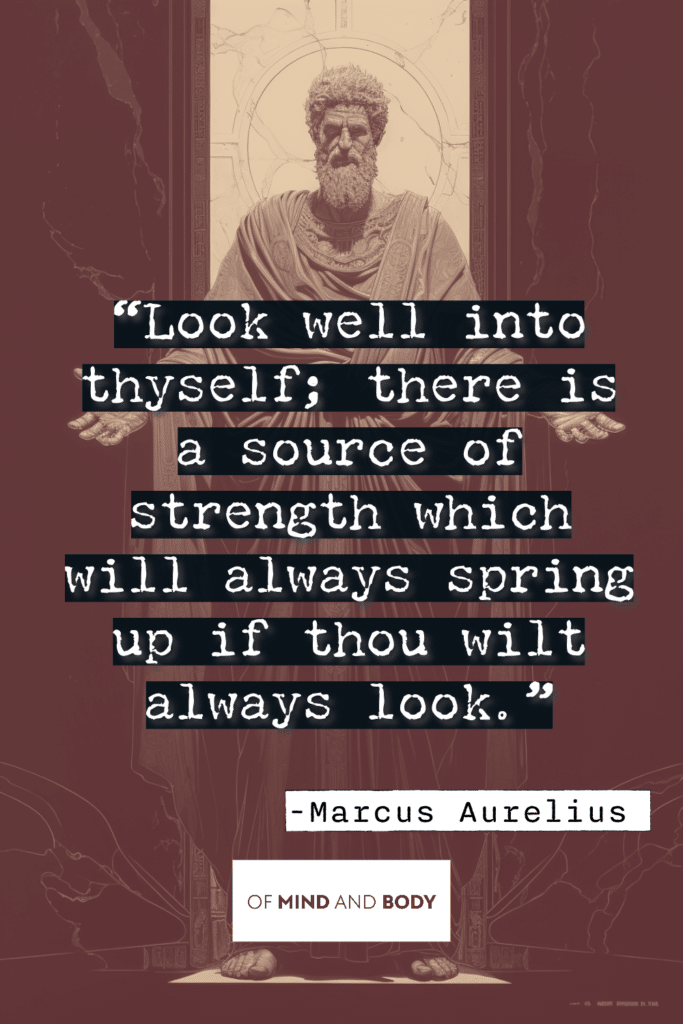
The Wisdom Behind the Words
In this insightful quote, Marcus Aurelius, the renowned Stoic philosopher and Roman Emperor, encapsulates a profound truth about self–improvement and the relentless pursuit of personal growth. The essence of his message lies in the introspective journey into the self, a journey that unlocks a reservoir of inner strength. Aurelius prompts us to delve deeply into our own being, suggesting that the key to enduring strength and resilience lies not in external sources, but within ourselves. This introspection is not a mere contemplation but an active engagement with our innermost values, beliefs, and capabilities.
Aurelius’ philosophy here is a call to self–awareness, a vital component of self–improvement. By looking within, we confront not only our strengths but also our weaknesses, fears, and insecurities. This confrontation is not to belittle ourselves but to understand and harness these elements as catalysts for growth.
The act of consistently turning inwards teaches us to cultivate a mindset that views challenges as opportunities for development, and failures as lessons in disguise. In this way, the process of self–improvement becomes a continuous cycle of learning, evolving, and adapting, driven by the inexhaustible well of strength that resides within us.
Moreover, Aurelius’ words resonate with the Stoic belief in the power of personal responsibility and control over one’s own life. The strength he refers to is the strength of character – the ability to remain steadfast, composed, and true to one’s virtues regardless of external circumstances.
This inner strength becomes a compass guiding us through life’s tumultuous journey, ensuring that our actions and decisions are aligned with our deepest values and principles. It’s a reminder that in the relentless pursuit of becoming our best selves, the most transformative power is already within us, waiting to be acknowledged and harnessed. Such a perspective shifts the paradigm of self–improvement from an external quest to an internal awakening, making the journey not just one of achievement, but of profound self-realisation and fulfilment.
Stoic Quotes on Self Improvement from Seneca
“If you really want to escape the things that harass you, what you’re needing is not to be in a different place but to be a different person.”
Seneca

The Wisdom Behind the Words
Of all the profound quotes by Seneca these words encapsulate the essence of self–improvement from a Stoic perspective. It suggests that the key to overcoming life’s challenges lies not in changing our external circumstances, but in transforming ourselves.
This idea is both empowering and daunting, as it places the responsibility of change squarely on our shoulders. Rather than seeking solace in a change of scenery or circumstance, Seneca urges us to delve inward, to fundamentally alter how we interact with the world. This shift from external to internal is a call to personal empowerment, highlighting that true freedom and peace come from within.
Seneca’s words encourage us to examine our own reactions, beliefs, and attitudes. It’s a call to self-awareness and mindfulness, urging us to become observers of our own minds.
By understanding our thoughts and emotions, we gain the power to reshape them. This is not a superficial change, but a deep, personal evolution. It’s about cultivating virtues like resilience, patience, and wisdom. This process of inner transformation is at the heart of self–improvement, where the journey itself becomes a path to greater self-understanding and wisdom. It’s a reminder that while we can’t control external events, we have immense power to control our reactions and, in turn, our destiny.
Moreover, this quote is a beacon of hope and a testament to human potential. It reassures us that no matter the situation, there is always room for growth and improvement. Every challenge, every obstacle becomes an opportunity to become a better version of ourselves.
The focus shifts from trying to control the uncontrollable to mastering the one thing we can truly influence – ourselves. This philosophy does not promise an easy journey, but it offers a fulfilling one. It’s a journey where each step forward, no matter how small, is a triumph in the art of living, a testament to the unyielding strength and adaptability of the human spirit. In embracing Seneca’s wisdom, we find not just a way to escape what harasses us, but a way to thrive in the midst of it, growing stronger and wiser with each challenge we overcome.
“Difficulties strengthen the mind, as labour does the body.”
Seneca
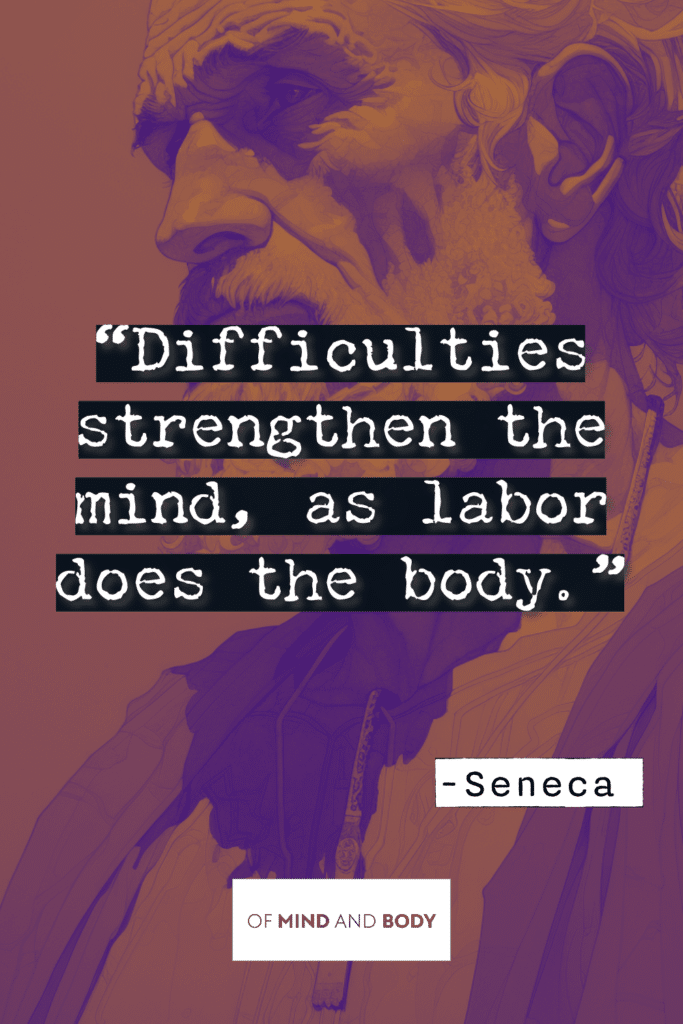
The Wisdom Behind the Words
This insightful quote by Seneca encapsulates a fundamental principle of Stoic philosophy and offers profound wisdom on the journey of self–improvement. It draws a powerful parallel between physical exercise and the challenges of life, suggesting that just as physical labour fortifies the body, mental and emotional challenges fortify the mind.
In the realm of self–improvement, this perspective is transformative; it re-frames difficulties not as obstacles to be avoided, but as opportunities for growth and strengthening of character.
Delving deeper, this quote highlights the importance of resilience and adaptability. In life’s gymnasium, each difficulty is akin to a new exercise for the mind, pushing its limits and expanding its capabilities.
When faced with challenges, one has the chance to practise patience, develop problem-solving skills, and cultivate emotional intelligence. This process is not merely about enduring hardships but actively engaging with them, learning from them, and emerging more robust and wise.
It’s a call to embrace life’s struggles with the same enthusiasm one might have for a workout that promises a stronger, healthier body. The beauty of this philosophy lies in its empowering message: you are not a passive recipient of life’s vicissitudes; you are an active participant in shaping your mental and emotional prowess.
Moreover, Seneca’s stoic quotes serve as a reminder that the path to self–improvement is not one of comfort and ease but of effort and perseverance. Just as muscles grow through the stress and recovery of exercise, so does the mind expand through the trials and triumphs of life’s experiences.
This quote urges us to view every challenge as a step towards a more resilient, capable, and self-aware version of ourselves. It’s a call to action, encouraging us to step out of our comfort zones, to face our fears, and to turn adversities into stepping stones towards personal growth and fulfilment. In the grand narrative of self-improvement, every difficulty is a chapter that contributes to the story of a life well-lived, marked by continuous learning and unyielding strength of character.
“Life is like a play: it’s not the length, but the excellence of the acting that matters.”
Seneca
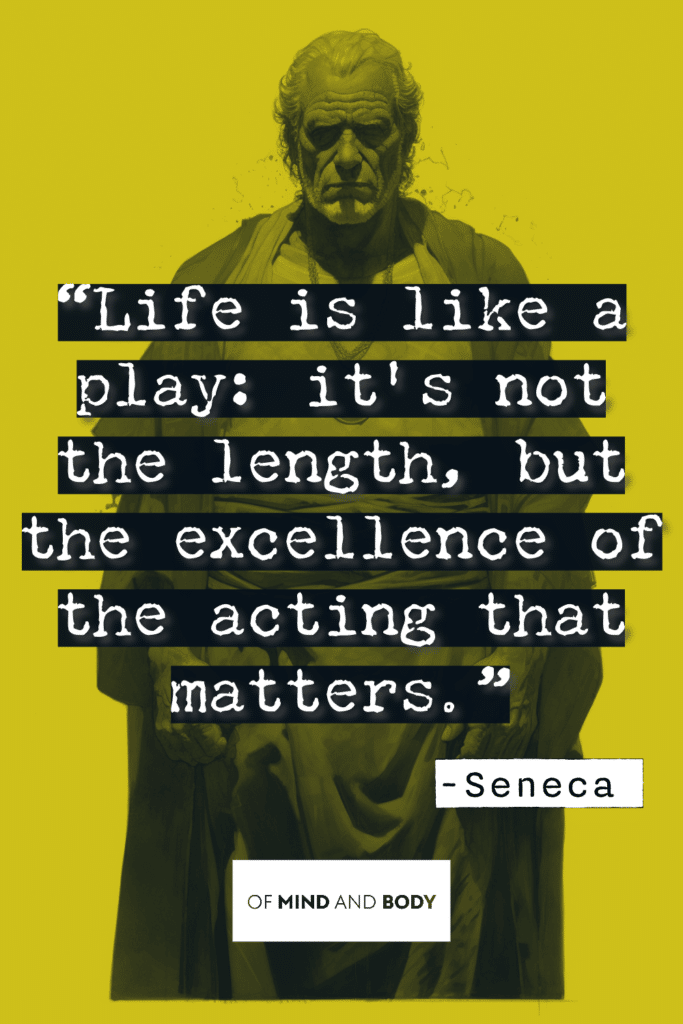
The Wisdom Behind the Words
In these stoic quotes of Seneca there lies a profound and timeless wisdom relevant to the journey of self–improvement. This metaphor transcends mere poetic imagery to offer a lucid perspective on life’s intrinsic value and our role within it.
Like actors on a stage, each of us is given a role to play, a part uniquely ours in the grand narrative of existence. Seneca’s emphasis on ‘excellence of acting’ rather than the ‘length of the play’ serves as a potent reminder that the quality of our lives is not determined by its duration, but by the depth and authenticity with which we live each moment.
At the heart of this philosophy is the Stoic ideal of living virtuously, embracing our individual circumstances with grace and purpose. Self–improvement, in this context, is not about striving for a perfect life, unmarred by challenge or sorrow, but about cultivating resilience, wisdom, and moral strength, regardless of life’s vicissitudes. It urges us to focus on what we can control – our actions, choices, and attitudes – and to do so with excellence.
This means acting with integrity, kindness, and courage, making the most of the ‘scenes’ we are in, whether they be of triumph or tribulation. It’s about enhancing our character in every act, small or large, and recognising that each moment is an opportunity to embody the virtues we aspire to.
Furthermore, Seneca’s analogy inspires a shift in perspective from external achievements to internal growth. It suggests that the true measure of a life well-lived lies in the inner landscape of our being – in the cultivation of a rich, robust inner world. In the pursuit of self–improvement, these stoic quotes motivate us to seek personal development not as a means to an end but as an end in itself.
The focus becomes less about reaching a destination of ‘improved self’ and more about the ongoing process of becoming, of refining and expressing our deepest selves in the myriad roles we play. Ultimately, this Stoic wisdom invites us to embrace life’s ephemeral nature and to infuse every act with purpose and presence, turning the ordinary into the extraordinary.
“Luck is what happens when preparation meets opportunity.”
Seneca
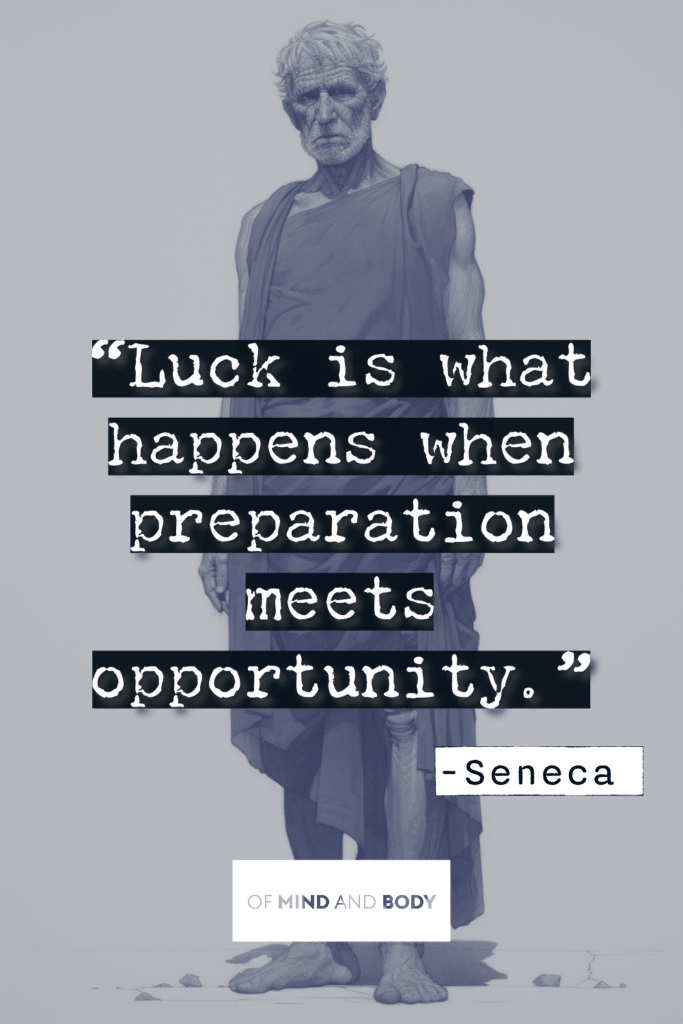
The Wisdom Behind the Words
This profound quote by Seneca encapsulates a timeless truth: the intersection of preparation and opportunity is often perceived as luck. It’s a powerful reminder that in the realm of self–improvement, our fortunes are not merely handed to us by fate; rather, they are often the result of our own actions and preparedness.
This perspective encourages us to take active control of our lives, understanding that the path to personal growth and achievement is paved with diligent preparation and a keen awareness for seizing opportunities.
At its core, this quote challenges the common misconception of luck as a whimsical, uncontrollable force. Instead, it positions luck as a byproduct of one’s efforts and readiness.
This shift in perspective is vital for anyone on a journey of self–improvement. It suggests that while we cannot control every circumstance, we can cultivate the skills, knowledge, and mindset necessary to capitalise on opportunities when they arise.
This approach not only enhances our ability to navigate life’s unpredictable tides but also empowers us to create our own opportunities. In this way, preparation becomes an ongoing process of self-reflection, learning, and growth, building a foundation upon which serendipity can find its footing.
Moreover, embracing this philosophy fosters a proactive rather than reactive approach to life. It encourages us to step out of the passive role of waiting for chances and instead, actively create conditions conducive to success. This means constantly honing our skills, broadening our understanding, and nurturing a state of readiness. In doing so, we not only become architects of our own fate but also gain a deeper sense of fulfilment and purpose.
We come to recognise that our greatest achievements are not just the result of fortuitous alignment but are deeply rooted in the efforts we’ve invested in ourselves. In the end, this stoic wisdom serves as a clarion call to embrace the power within us to forge our destiny, reminding us that in the alchemy of life, we are both the catalyst and the creator of our own luck.
“No man was ever wise by chance.”
Seneca
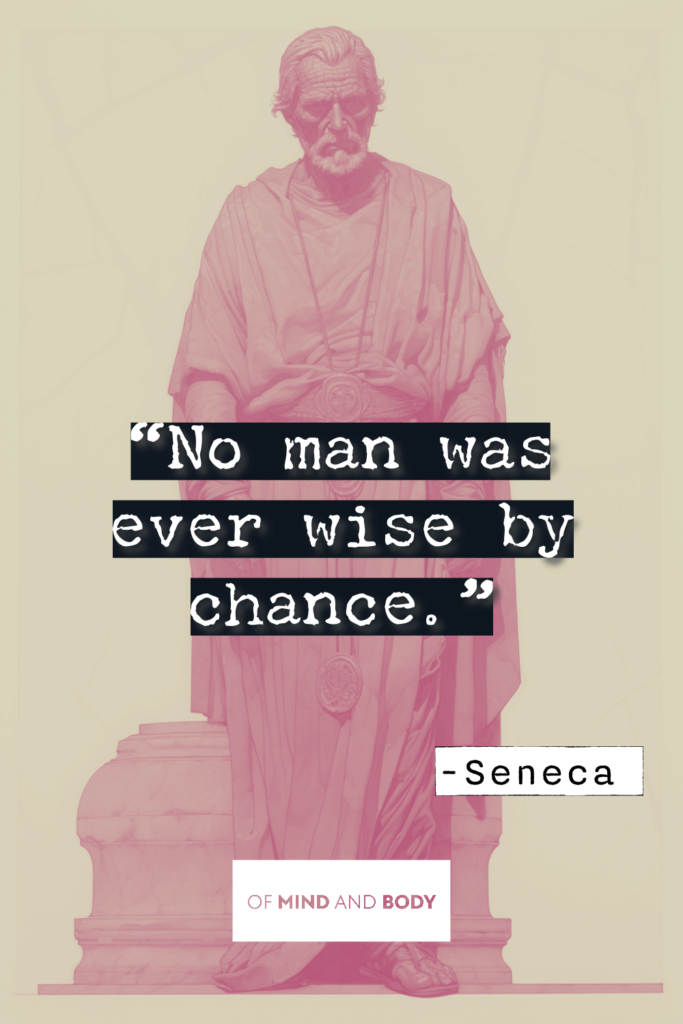
The Wisdom Behind the Words
This eloquent reflection by Seneca, the master of Stoic thought, unveils a deep truth about the quest for wisdom and self–improvement. It reveals that wisdom doesn’t just serendipitously manifest or is reserved for a privileged few. Instead, it blossoms from a garden of deliberate actions and choices. This notion is liberating, placing the keys to personal evolution and intellectual awakening in our own hands. It discredits the idea of wisdom as a scarce artefact, locked away from the masses. Instead, it suggests that wisdom is a treasure available to all who embark on the rigorous but rewarding voyage of self-exploration, continual learning, and personal advancement.
In the landscape of self–improvement, Seneca’s stoic quotes serve as a beacon, guiding us to recognise our growth as an active and perpetual journey. We become voyagers of life, ceaselessly seeking, absorbing, and evolving.
Wisdom here transcends the mere accumulation of facts; it’s an art form, skilfully blending knowledge with its practical, ethical application. This pursuit is akin to navigating the depths of our souls, our values, and the universe, transforming us into architects of our destiny, curators of our experiences, and narrators of our life’s story.
Moreover, this statement is a call, urging us to take the helm of our own development, to sail with intention and purpose through the vast seas of existence. The path to wisdom is marked with trials, introspection, and stark revelations about ourselves and our world.
Embracing this odyssey, with all its intricacies and challenges, is what infuses life with richness and meaning. It allows us to blossom, not by mere chance, but through a conscious, deliberate dance of self-evolution. In this journey, we not only transform ourselves but also cast ripples of growth and enlightenment, enriching the tapestry of the world around us.
“Associate with people who are likely to improve you.”
Seneca
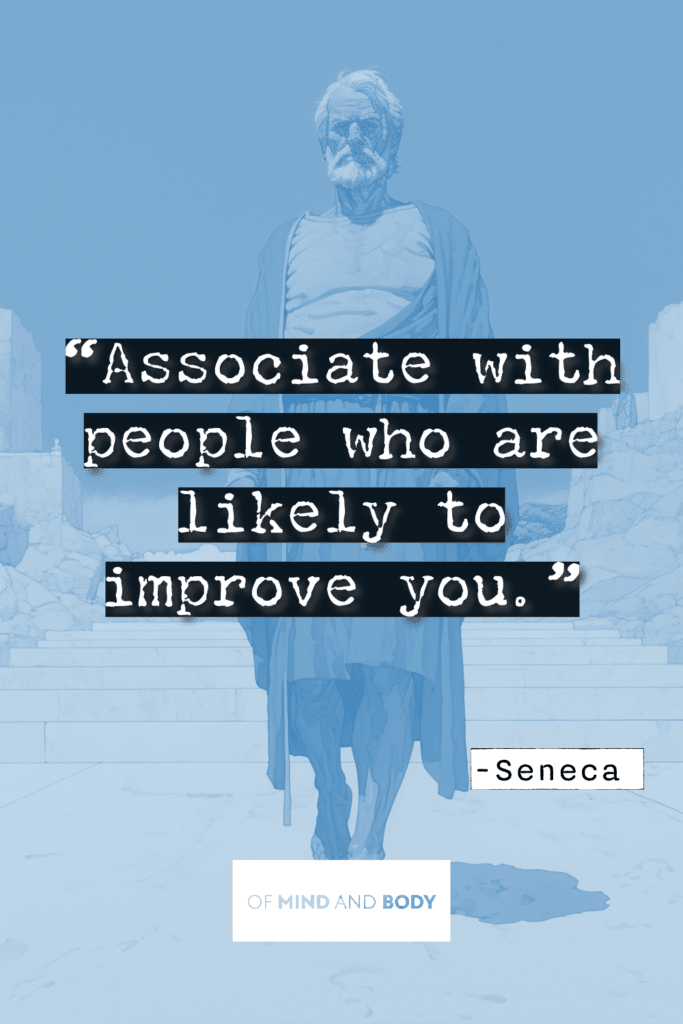
The Wisdom Behind the Words
This profound quote by Seneca encapsulates a timeless wisdom that is highly relevant in the context of self–improvement. At its core, the quote underscores the significance of our social environment in shaping our character, beliefs, and ultimately, our destiny.
Seneca’s advice is not just about forming relationships for personal gain, but rather about surrounding oneself with individuals who inspire, challenge, and elevate us. In the journey of self–improvement, the people we choose to associate with can act as mirrors, reflecting back to us not only who we are but also who we aspire to be.
In the realm of personal growth, the influence of our companions cannot be overstated. Just as a plant thrives in a nourishing environment, our personal development is deeply influenced by the quality of our relationships. When we surround ourselves with people who embody the virtues we admire – wisdom, integrity, resilience, and kindness – we are naturally inclined to emulate these qualities.
These associations become a powerful catalyst for transformation, subtly guiding us to question our own values, rethink our choices, and strive for a higher standard of living. Conversely, in the company of those who foster negativity or complacency, we may find our growth stunted, our aspirations dimmed.
Thus, this quote is a reminder to consciously curate our social circle, seeking out those who not only align with our values but also challenge us to evolve. It’s about recognising that self–improvement is not a solitary endeavour, but a journey enriched by the wisdom, support, and inspiration of others. In doing so, we not only enhance our own lives but also contribute positively to the lives of those around us, creating a virtuous cycle of growth and enrichment. In this light, Seneca’s words serve as a beacon, guiding us towards a life of continual learning, self-reflection, and meaningful connections.
Final Thoughts
As we draw our exploration of Stoic quotes on self–improvement to a close, it becomes increasingly clear how deeply the Stoic philosophy is woven into the fabric of personal growth and resilience. Stoicism then emerges as a timeless guide for living a life marked by wisdom, virtue, and emotional intelligence. The Stoic teachings, as reflected in these quotes, don’t merely offer theoretical knowledge; they provide practical tools for navigating the complexities of modern life, emphasising control over our reactions, adaptation to change, and the pursuit of inner peace.
Incorporating Stoic principles into our daily lives can lead to profound transformations. It encourages us to meet challenges with equanimity, to find strength in adversity, and to cultivate a sense of contentment that is not reliant on external circumstances. The path of Stoicism is about continuous learning and self–reflection, urging us to evolve and grow, not just for our own benefit but for the greater good of those around us. It reminds us that self–improvement is an active, ongoing journey, one that requires patience, persistence, and a deep commitment to living our values.
If you’ve enjoyed this article on Stoic Quotes for Self Improvement, you may find some of our other posts just as enlightening:
Stoic Quotes on Strength – 12 Powerful Lessons on Life
Stoic Quotes on Anxiety – Decoding Ancient Wisdom for Resilience
Furthermore, if you’re interested in learning more about Stoicism direct from the philosophers themselves, consider the books below:
To those who find themselves inspired by the Stoic approach to life and eager to delve deeper, I extend an invitation to join my Introduction to Stoicism course. This course is designed not just to educate but to transform, offering a structured path to integrate Stoic wisdom into your daily practices. Whether you’re seeking to enhance your resilience, improve your decision-making, or find greater fulfilment in life, this course is a stepping stone towards actualising those goals. I encourage you to sign up and embark on a journey that promises not just learning, but a profound personal metamorphosis. Let the timeless wisdom of Stoicism light your way to a life of purpose, balance, and enduring happiness.
As ever, thank you for reading.






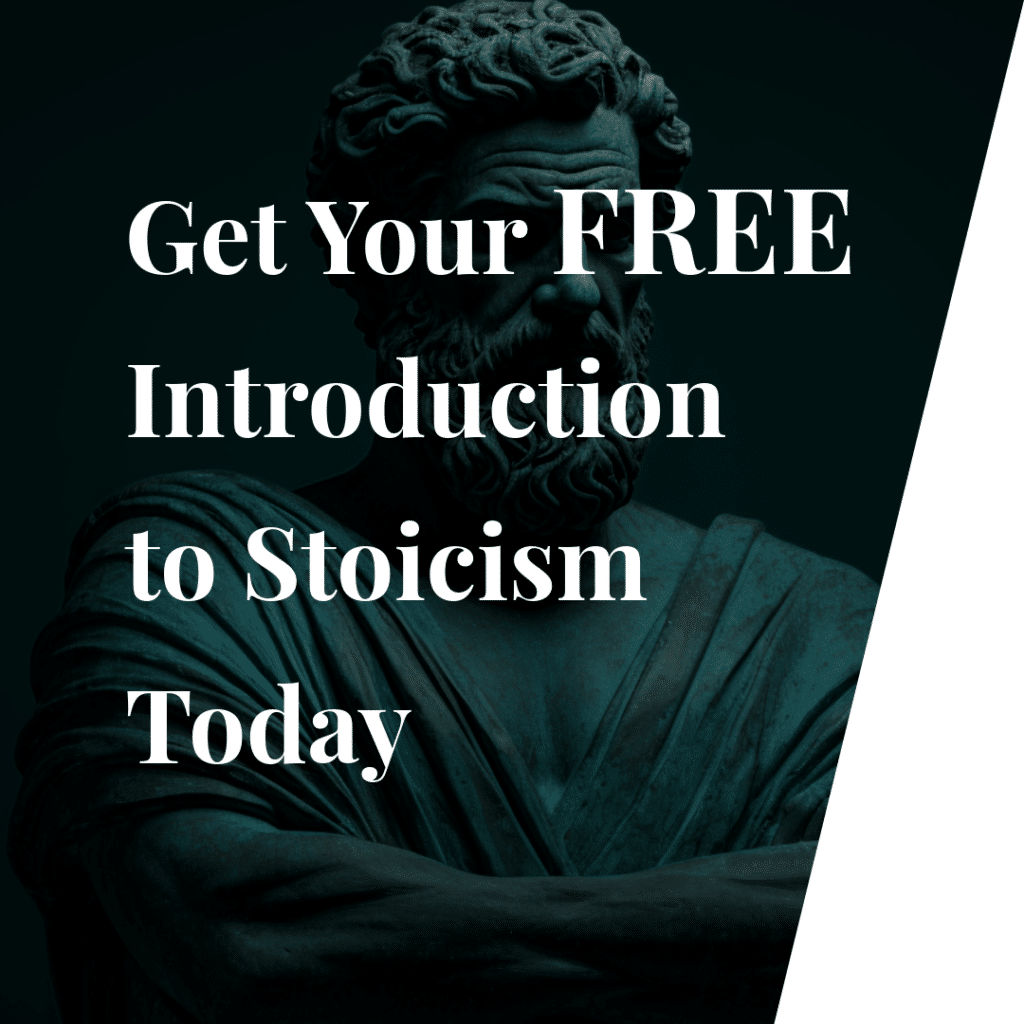
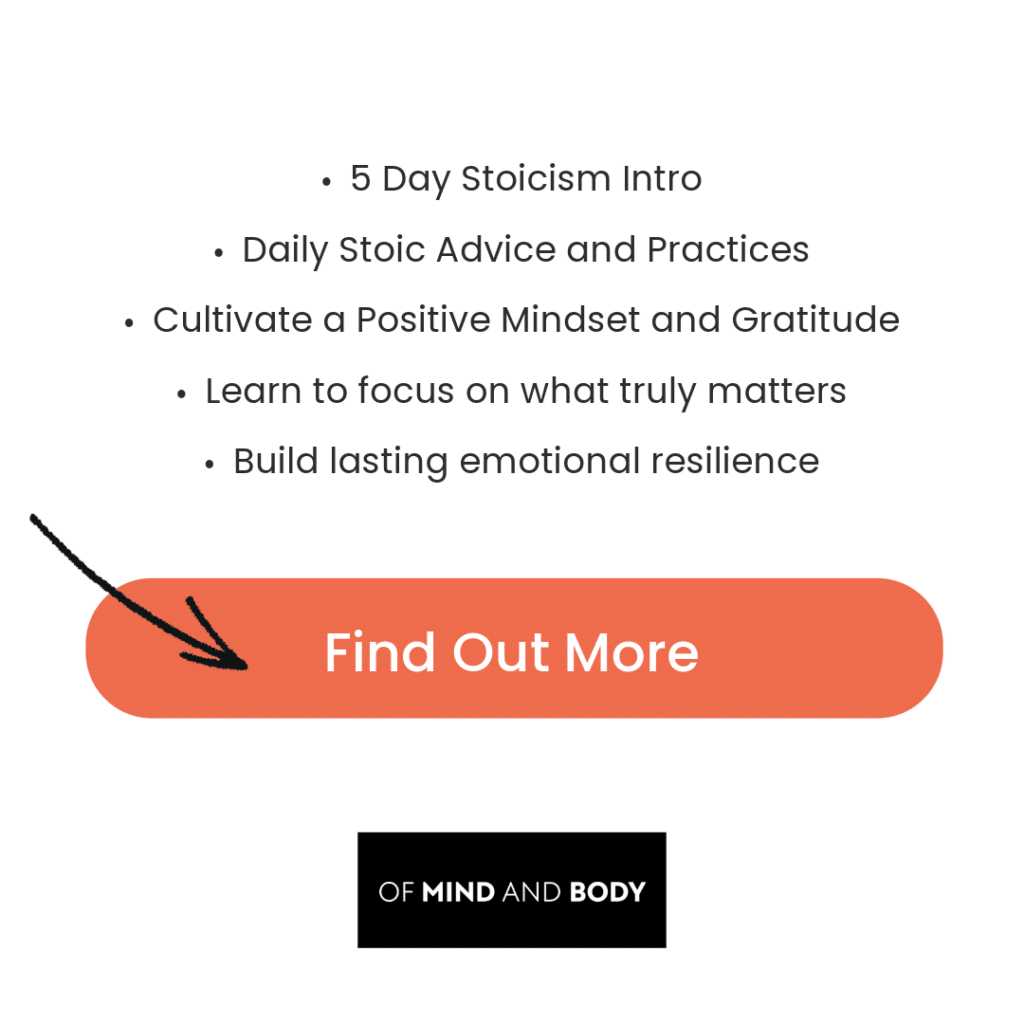



One Response